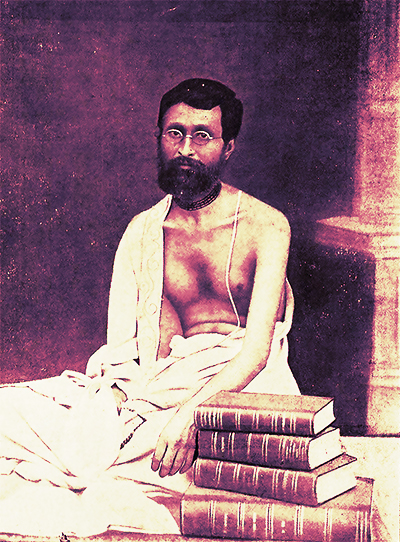śrī śrī guru gaurāṅga jayataḥ!

Year 10, Issue 6
Posted: 20 July 2017
Dedicated to
nitya-līlā praviṣṭa oṁ viṣṇupāda
Śrī Śrīmad Bhakti Prajñāna Keśava Gosvāmī Mahārāja
Inspired by and under the guidance of
nitya-līlā praviṣṭa oṁ viṣṇupāda
Śrī Śrīmad Bhaktivedānta Nārāyaṇa Gosvāmī Mahārāja
Kṛṣṇa-nāma, Kṛṣṇa-dhāma and Kṛṣṇa-kāma

How can they who are busy maintaining their wife and children and who give shape to their desires for enjoyment – desires arising out of error, or out of illusion – act as jagad-guru, the true instructors of people? They try to employ God – the highest Entity to be adored and served – in supplying them fuel for the fire of their desire.
What do we find in the Śrīmad-Bhāgavatam and in the conduct and teachings of Śrī Caitanya Mahāprabhu and His devotees? They inform us that such people have not surrendered themselves to God. In their hearts they cherish fear, affliction, erroneous, illusory ideas, [worldly] desire and greed, and feelings of distress concerning their body, their wealth and their relations with friends, and on and on. They experience all of this on account of their attachment to some second object besides Him.
People like this, who have no dedication themselves, cannot advise others to surrender to God. Even if they give verbal instructions to do so, their preaching, bereft of the practical example within their own conduct, is ineffective. Only a mahā-bhāgavata can legitimately occupy the ācārya’s seat. A mahā-bhāgavata is niṣkiñcana (has nothing to call his own in the world), and has sincerely surrendered his very self to Kṛṣṇa. He serves Him exclusively, cent per cent, every hour of every day.
Those who attend to the service of God’s name (nāma), His abode (dhāma) and His desire (kāma) are the only really adorable ones in the world. No being can extricate himself from wrong understandings due to māyā without engaging in service to śrī nāma. As the result of service to śrī nāma, men can be rid of all prejudices and become settled in the service of Kṛṣṇa’s desires (kṛṣṇa-kāma-sevā).
From dhāma-sevā (service to His abode, or home), one can be rid of the clutches of the tremendously dangerous doctrine embodied in the thought that ”I am the Lord; there is no other God possessing an eternal name, form, attributes, sports, majesty or the like.” And from kṛṣṇa-kāma-sevā, one can save oneself from the serious danger that takes shape as the desire to gratify one’s senses. Being thus freed from temporal lust, one can become firmly established in serving the Transcendental Cupid, Kāmadeva Śrī Kṛṣṇa, and of kāma-gāyatrī.
If we are fortunate, and we are able to secure attachment to kṛṣṇa-kāma-sevā, the course of our various inferior desires will change. Desires arising in us for the sensual enjoyment of our material body will be redirected. And at the same time, our subtle body, especially our mind, which has been running us along a road borne of growing apathy towards serving God, will then take just the contrary trend.
And that kṛṣṇa-kāma-sevā is available if we engage ourselves in the service of śrī dhāma. The word dhāma means ‘rays’, ‘prowess’, ‘influence’, ‘home’, ‘place’, ‘body’, ‘birth’, and so on. According to the sense accepted by the truly learned savants, śrī dhāma is that place in which there is neither self-malice, nor jealousy nor evanescence, and it is that place which is eternally self-manifest, spiritual and blissful. Śrī Caitanyadeva, having made His advent in that transcendent dhāma, has made the world full of consciousness.
We thought that we would vanquish the people of the world by means of dialectics, the splendor of erudition and the glory of exemplary character, so we remained engaged in studies. We failed to realize how exalted the dhāma was and thus had no predilection for dhāma-sevā. And we had little faith in the worshipable representative (mūrti) of God. But a certain holy saint engaged us in dhāma-sevā, saying that it would bring the highest welfare. He who connects himself with śrī dhāma will soon see that his attachment to grāma, or domesticated life and all connections therewith, have been liquidated. Then śrī nāma sevā, the means of attaining true blessedness, shall quickly bring us our real end: kṛṣṇa-kāma.
Śrī vaikuṇtha-nāma alone has come down to this earth, and it is in śrī dhāma that śrī nāma has been deposited. Pretentious nāma-sevā performed by one who disconnects oneself from śrī dhāma, does not give the real end: kṛṣṇa-kāma-sevā.
Adapted from The Gaudiya Volume 5, Number 7
by the Rays of The Harmonist team